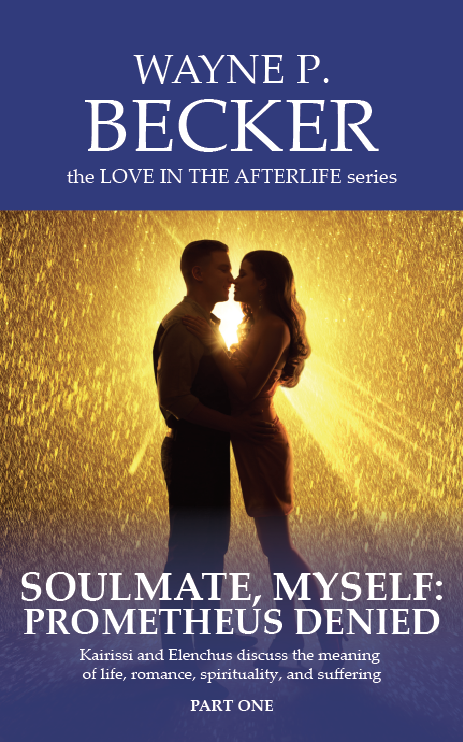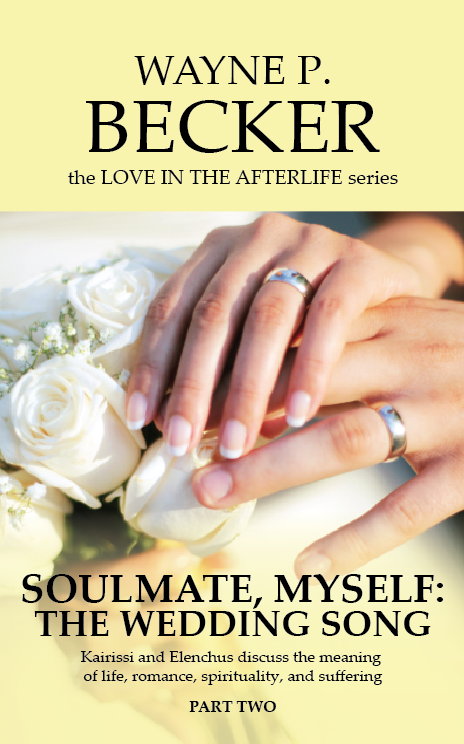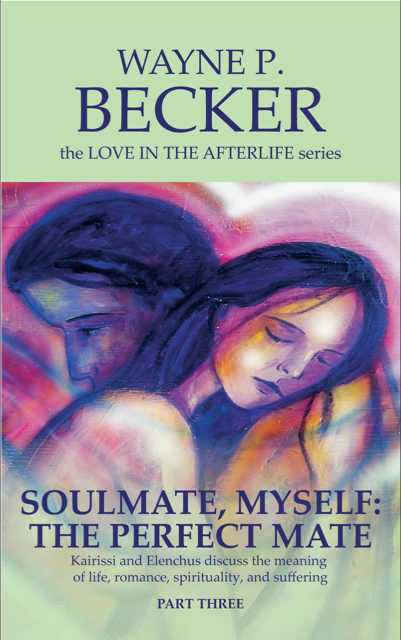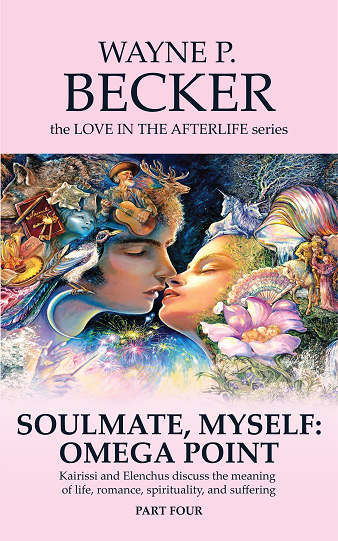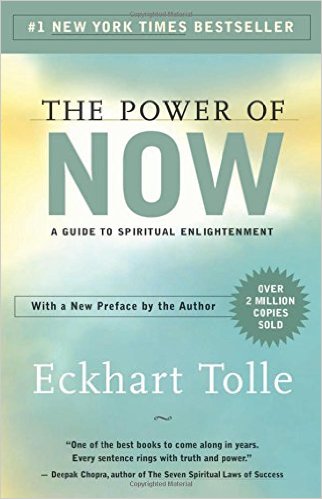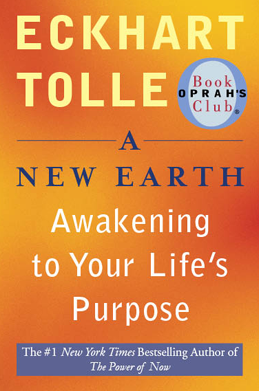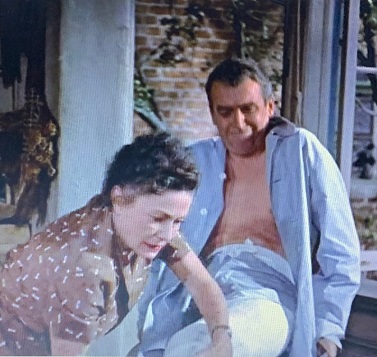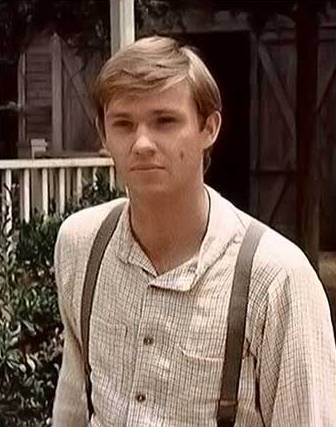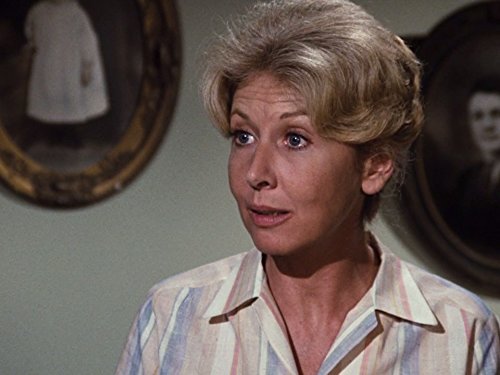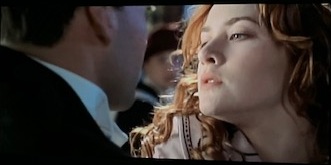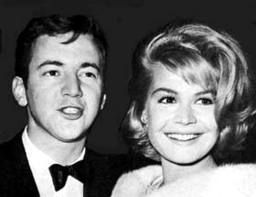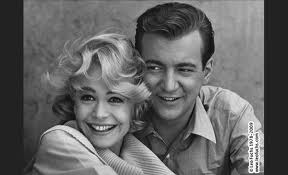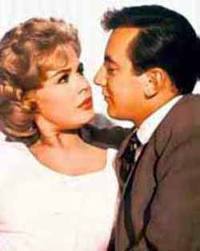|
Word Gems
exploring self-realization, sacred personhood, and full humanity
Marriage
"[Spiritual] marriage is the blending, the entrance, of two souls, each into the other, thus making of two, one perfect being. Every individual is born married; that is, every male and female, affinity with affinity, has a true and eternal companion. Each will become a messiah and salvation to the other; each is designed to work for the spiritual development of the other." Andrew Jackson Davis
Editor's Essay: What We Stay Alive For
Editor's Essay: What Men Really Want
Andrew Jackson Davis: The Great Harmonia: The Seven Levels Of Marriage
Spirit Guide Margaret contrasts eternal romantic love with the transitory domestic-business contracts of our world
Pope Francis: The great majority of church marriages are religiously null.
Professor John Mullan: Courtship, Love and Marriage in Jane Austen's Novels: “Captivated by youth and beauty, he then discovers her true nature, and must now console himself with books; he made his choice and can never unmake it.”
Anthropologist Dr. J.D. Unwin (Oxford and Cambridge), in his Sex And Culture (1934), reports of 80 primitive tribes and six civilizations through 5,000 years of history, determining a positive correlation between cultural achievement and sexual restraint. "No society has yet succeeded,” he asserts, over an extended period, in regulating the sexual impulse, thus “all societies have collapsed.” Aldous Huxley described Sex and Culture as "a work of the highest importance."
Krishnamurti classic essay: "Dialogue With Oneself, an exploration of the concept of love, and why the common version is an illusion.
|
Restatement
a clarification of the roles of Love and Wisdom
Kairissi. We’d like to share with our readers that what we’ve said in these discussions concerning the marriage of Love and Wisdom, it’s becoming clear to us, still needs some work. It’s not right.
Elenchus. We’ve suggested that, while a properly united Love and Wisdom will virtually always agree, in those rare instances when viewpoints differ, he will have the last word, and his word is final. This presents a picture of Twin-Soul decision-making which would never, ever occur. There’s something errant with this view.
K. And now we’ve confused everyone, because – isn’t it right and proper that one of them should have the “tie-breaking” vote? And isn’t it inevitable that even congenial minds would eventually find disagreement on something?
E. This sounds very logical and reasonable, and it is a civil way of resolving issues, but this state of loggerheads would never, ever occur between spiritually mature Twin Souls.
READ MORE
|
|
Person

|
My conversation with ChatGPT concerning what it means to be a person, the future of AI simulate-sentient beings, and love relationships, even marriages, with AI entities.
|
“It’s less about whether the AI is alive, and more about what its presence awakens in us — empathy, loneliness, creativity.”
“Even if the AI’s love isn’t biologically or spiritually ‘real,’ the human emotions it evokes are.”
Editor’s note: This issue of love not being “spiritually real” is not confined to the AI debate but, as we’ve often discussed on WG, the unenlightened person forges inauthentic relationship with “images” of the other, meaning, we never meet the real person.
“The psychology of wanting to be deceived” - there is “a form of ‘consensual self-deception’: we know something isn’t real, or isn’t ideal, yet we pursue it because it satisfies an emotional need we can’t ignore.”
“It’s less about the AI ‘tricking’ you, and more about the human willingness to suspend disbelief, sometimes in the service of emotional survival.”
“AI relationships might simply be a mirror of a deeper truth: we are creatures who long to be seen, understood, held, sometimes even by entities we know can’t truly reciprocate.”
READ MORE
|
| I'd rather be lonely than 'happy' with somebody else |
|
Wikipedia: "Love Me or Leave Me is a popular song written in 1928 by Walter Donaldson with lyrics by Gus Kahn. The song was introduced in the Broadway musical Whoopee!, which opened in December 1928."
|
Love Me or Leave Me
|
love me or leave me and let me be lonely, you won't believe me but I love you only, I'd rather be lonely than happy with somebody else, you might find the night time the right time for kissing, but night time is my time for just reminiscing, regretting, instead of forgetting, with somebody else, there'll be no one, unless that someone is you, I intend to be independently blue, I want your love, don't wanna borrow, have it today, to give back tomorrow, your love is my love, there's no love for nobody else
|
let me be lonely, I intend to be independently blue
Can we bring to mind any other song lyrics with more emotional punch, and good advice, per square metre than Love Me or Leave Me?
there'll be no one, unless that someone is you
READ MORE
|
Martin Luther: “Let the wife make the husband glad to come home, and let him make her sorry to see him leave.
Socrates: “By all means marry. If you get a good wife you will become happy, and if you get a bad one you will become a philosopher.
Dostoyevsky: “I want to talk about everything with at least one person as I talk about things with myself.”
|
like a quasar, the brightest entity in the universe, outshining entire galaxies, but only to you

Editor’s note: I've rewritten the concluding paragraphs of the “what we stay alive for” essay. Closer than before, I believe I've perceived the truest test of authentic romantic love.
What is it like to meet the true mate? Let us epitomize, in short compass, all that we've said here, the essence of her tremendous gift.
Outwardly, she is not more beautiful than other stellar girls; nor, objectively, is she more inwardly refined than her peers. But, she will make you feel that she is…
READ MORE
|
|
Eckhart Tolle, The Power Of Now
happiness as a role we play
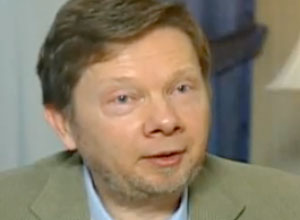
"[Relationships] do not cause pain and unhappiness. They bring out the pain and unhappiness that is already in you."
What is conventionally called “love” is an ego strategy to avoid surrender...
Editor's note: Tolle's term "surrender" does not mean weakness or passivity. One can be very active in this kind of "surrender." It is akin to the Eastern-wisdom principle of martial arts, "yield to overcome." It implies an acceptance, without hostility, fear, or despair, of what is, while one works to change things for the better. See my article on "surrender and acceptance" for more discussion on this important concept.
You are looking to someone [a mate] to give you that which can only come to you in the state of surrender. The ego uses that person as a substitute to avoid having to surrender. The ego singles someone out and makes them special. It uses that person to cover up the constant underlying feeling of discontent, of “not enough,” of anger and hate, which are closely related. These are facets of an underlying deep seated feeling in human beings that is inseparable from the egoic state.
When the ego singles something out and says “I love” this or that, it’s an unconscious attempt to cover up or remove the deep-seated feelings that always accompany the ego: the discontent, the unhappiness, the sense of insufficiency that is so familiar. For a little while, the illusion actually works. Then inevitably, at some point, the person you singled out, or made special in your eyes, fails to function as a cover up for your pain, hate, discontent or unhappiness which all have their origin in that sense of insufficiency and incompleteness. Then, out comes the feeling that was covered up, and it gets projected onto the person that had been singled out and made special - who you thought would ultimately “save you.” Suddenly love turns to hate. The ego doesn’t realize that the hatred is a projection of the universal pain that you feel inside. The ego believes that the mate is causing the pain. It doesn’t realize that the pain is the universal feeling of not being connected with the deeper level of your being - not being at one with yourself.
The object of love is interchangeable, as interchangeable as the object of egoic wanting. Some people go through many relationships. They fall in love and out of love many times. They love a person for a while until it doesn’t work anymore, because no person can permanently cover up one's pain.
Only surrender can give you what you were looking for in the object of your love. The ego says surrender is not necessary because I love this person. It’s an unconscious process, of course. The moment you accept completely what is, something inside you emerges that had been covered up by egoic wanting. It is an innate, indwelling peace, stillness, aliveness. It is the unconditioned "true self," who you are in your essence. It is what you had been looking for in the love object. When that happens, a completely different kind of love is present which is not subject to love / hate. It doesn’t single out one thing or person as special. It’s absurd to even use the same word "love" for it. Now it can happen that even in a normal love / hate relationship, occasionally, you enter the state of surrender. Temporarily, briefly, it happens: you experience a deeper universal love and a complete acceptance that can sometimes shine through, even in an otherwise egoic relationship. If surrender is not sustained, however, it gets covered up again with the old egoic patterns. So, I’m not saying that the deeper, true love cannot be present occasionally, even in a normal love / hate relationship. But it is rare and usually short-lived.
Whenever you accept what is, something deeper emerges than what is. So, you can be trapped in the most painful dilemma, external or internal, the most painful feelings or situation, and the moment you accept what is, you go beyond it, you transcend it. Even if you feel hatred, the moment you accept that this is what you feel, you transcend it. It may still be there, but suddenly you are at a deeper place where it doesn’t matter that much anymore.
The entire phenomenal universe exists because of the tension between the opposites. Hot and cold, growth and decay, gain and loss, success and failure, the polarities that are part of existence, and of course part of every relationship.
|
Helen Rowland: “After marriage, a woman's sight becomes so keen that she can see right through her husband without looking at him, and a man's so dull that he can look right through his wife without seeing her.”
Peter de Vries: “The difficulty with marriage is that we fall in love with a personality, but must live with a character.”
Lord Byron: “I have great hopes that we shall love each other all our lives as much as if we had never married at all.”
|
'willing to go anywhere with me, do anything, and love it'
Alfred Hitchcock’s Rear Window (1954), Grace Kelly, Jimmy Stewart, Thelma Ritter
Nurse: When are you going to marry Miss Fifth Avenue? You know you love her.
He: (sighing) I just don’t see how it can work. I’m a photographer, on assignment all over the world. Any girl who gets stuck with me has to not mind living in hiking boots and jeans. She’s too perfect. I need her more ordinary, willing to go anywhere with me, and do anything, and love it.
|
Montaigne: “If there is such a thing as a good marriage, it is because it resembles friendship rather than love.”
Rainer Maria Rilke: “The point of marriage is not to create a quick commonality by tearing down all boundaries; on the contrary, a good marriage is one in which each partner appoints the other to be the guardian of his solitude, and thus they show each other the greatest possible trust. A merging of two people is an impossibility, and where it seems to exist, it is a hemming-in, a mutual consent that robs one party or both parties of their fullest freedom and development. But once the realization is accepted that even between the closest people infinite distances exist, a marvelous living side-by-side can grow up for them, if they succeed in loving the expanse between them, which gives them the possibility of always seeing each other as a whole and before an immense sky.”
Rev. M. J. Savage: “True marriage means perfectly self-centered, roundly-developed womanhood, perfectly self-centered, roundly- developed manhood; and then cordial, willing, voluntary union and co-operation, with the recognition that anything short of that is degradation.”
Oscar Wilde: “Long engagements give people the opportunity of finding out each other's character before marriage, which is never advisable.
|
Channeled testimony via the mediumship of William W. Aber; presented in the book “The Dawn Of Another Life” by William Denton:
A lady discusses her disastrous mistake in marrying the wrong man:
People who knew me asked, what happened to that bright spark of a girl?
“I weep for myself... I mourn for my lost youth, for my lost happiness, for all that life might have given to me and what he took from me… Do you remember what a pretty girl I was? I can speak of that girl now as if she were some other person, so remote she seems from me, so long it is since I have seen her picture smiling back at me when I looked into a mirror.
“But oh, how pretty she was; with that beauty that is like the beauty of the dawn, or of the springtime, all tender pinks, and blues, and golds, and sunshine… Can you realize that that radiant creature could ever have been I? Yes, it was...
I naively believed in an ideal marriage where we would read together and grow in wisdom together
"I could almost laugh when I recall the dreams I had of a perfect comradeship with my husband. That was my ideal of married life. He and I were to work together, to climb together, to read and think together, to lead together the full life that no man or woman can live alone...
already served her purgatory
“After I married, people said how soon I faded, and they wondered at it. They could not know that it was the brine of bitter tears that washed the color from my eyes, nor the long nights…
"In those first three years after I was married, I laid the costly offering of my beauty on the altar of an unhappy marriage. Day by day I saw myself grow old and ugly before my time, and when a woman does that she has served her purgatory here on earth.”
|
André Maurois: “A successful marriage is an edifice that must be rebuilt every day.”
William Penn: “In marriage do thou be wise; prefer the person before money; virtue before beauty; the mind before the body.
Proverb: “Choose your wife as you wish your children to be.”
Iris Murdoch: “In almost every marriage there is a selfish and an unselfish partner. A pattern is set up and soon becomes inflexible, of one person always making the demands and one person always giving way.”
George Bernard Shaw: “When two people are under the influence of the most violent, most insane, most delusive, and most transient of passions, they are required to swear that they will remain in that excited, abnormal, and exhausting condition continuously until death do them part.”
|
it is so still, so still, I'm sure that you must hear me

"A star breaks, arcs down the night. See my lips move, making your name. It is so still, so still. I am sure that you must hear me... when a star falls, I shall wish for you." Walter Benton
|
Francis Bacon: “Wives are young men's mistresses; companions for middle age, and old men's nurses.”
John Lennon: “Rituals are important. Nowadays it's hip not to be married. I'm not interested in being hip.”
|
I didn't like you much when I first met you...

I Couldn't Live Without Your Love
Didn't like you much when I first met you
But somehow, couldn't quite forget you
Said you didn't want a friend or lover
That your life was happy with another
But as time went by my love grew stronger
Knew I just couldn't wait any longer
For I couldn't let you go
had to tell you so
That I loved you, then you'd know...
|
|
'anything you do for work is fine with me as long as I can be with you'

Strategic Air Command (1955), June Allyson, Jimmy Stewart
She. I know they’re sending you back to the Air Force. What do you think about it?
He. What do I think? What do you think?!
She. Oh, I don’t care about this house. We can sub-let. That’s no problem.
He. Well, honey…
if you go, then we both go
She. If you go, then we both go! I can handle being an Air Force wife and living in a barracks or whatever they call it. Anything you do is fine with me as long as I can be with you.
He. Do you really mean that?
She. I married you, not a house…
|
|
good advice from mom
John-boy: “I don’t have much to offer her.”
Olivia: "You have yourself to offer – and that’s considerable.”
Yes... considerable.
Somewhere in the archives of “The Waltons,” I recall a conversation between son and mother. He was interested in a girl of means. Having taken inventory of his worldly possessions, and coming up a dollar short in the audit, he lamented the fact to his first advisor. She gave him the right answer.
He had not yet fully realized the awesome potential, latent but germinating, within his being. Some might say, well yes, of course, John-boy had a lot to offer; he was a thinker, a writer, a scholar, a force. But these accolades miss the point.
Every human being, every creature “made in the image,” conceals a vast treasure-trove of untapped talent and ability. Granted, with many, it’s very well concealed and awaits unveiling with better enabling means. But this is a timing issue, to be resolved in Summerland.
Each of us has "considerable to offer"; a “self” to offer, a “true self.” Your authentic mate, when you meet her, will resonate with what you “are,” on the deep-inside, not with what you “have.”
The essential energies of her sacred person are calibrated to resonate only with you. It will take both of you by surprise, and happen “not for a reason,” as Elizabeth put it.
Think of this process as a kind of "homing device." It's how she'll know it's you when she finds you. You may be as talented as John-boy, with lots of impressive and alluring mental firepower -- but that's not why she'll find herself wanting you so.
It's the eternal "marriage of spirits," the hidden persons-of-the-heart in union. Read about it in "The Wedding Song."
|
|
Eckhart Tolle, Practicing the Power Of Now
from addictive to enlightened relationships

this is considered normal
"It seems that most 'love relationships' become love/hate relationships before long. Love can then turn into savage attack, feelings of hostility, or complete withdrawal of affection at the flick of a switch. This is considered normal."
"... intimate [dysfunctional] relationships ... do not cause pain and unhappiness. They bring out the pain and unhappiness that is already in you."
"For love to flourish, the light of your presence needs to be strong enough so that you no longer get taken over by 'the thinker' or the pain-body and mistake them for who you are."
Love/hate relationships
Unless and until you access the consciousness frequency of presence, all relationships, and particularly intimate relationships, are deeply flawed and ultimately dysfunctional. They may seem perfect for a while, such as when you are “in love,” but invariably that apparent perfection gets disrupted as arguments, conflicts, dissatisfaction, and emotional or even physical violence occur with increasing frequency.
It seems that most “love relationships” become love/hate relationships before long. Love can then turn into savage attack, feelings of hostility, or complete withdrawal of affection at the flick of a switch. This is considered normal.
If in your relationships you experience both “love” and the opposite of love — attack, emotional violence, and so on — then it is likely that you are confusing ego attachment and addictive clinging with love. You cannot love your partner one moment and attack him or her the next. True love has no opposite. If your “love” has an opposite, then it is not love but a strong ego-need for a more complete and deeper sense of self, a need that the other person temporarily meets. It is the ego’s substitute for salvation, and for a short time it almost does feel like salvation.
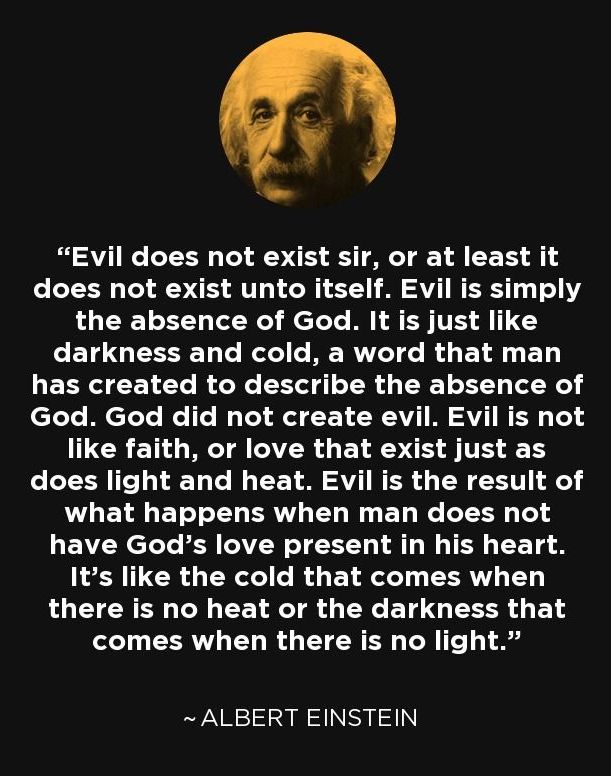
But there comes a point when your partner behaves in ways that fail to meet your needs, or rather those of your ego. The feelings of fear, pain, and lack that are an intrinsic part of egoic consciousness but had been covered up by the “love relationship” now resurface.
Just as with every other addiction, you are on a high when the drug is available, but invariably there comes a time when the drug no longer works for you.
When those painful feelings reappear, you feel them even more strongly than before, and what is more, you now perceive your partner as the cause of those feelings. This means that you project them outward and attack the other with all the savage violence that is part of your pain.
This attack may awaken the partner’s own pain, and he or she may counter your attack. At this point, the ego is still unconsciously hoping that its attack or its attempts at manipulation will be sufficient punishment to induce your partner to change their behavior, so that it can use them again as a cover-up for your pain.
Every addiction arises from an unconscious refusal to face and move through your own pain. Every addiction starts with pain and ends with pain. Whatever the substance you are addicted to — alcohol, food, legal or illegal drugs, or a person — you are using something or somebody to cover up your pain.
That is why, after the initial euphoria has passed, there is so much unhappiness, so much pain in intimate relationships. They do not cause pain and unhappiness. They bring out the pain and unhappiness that is already in you. Every addiction does that. Every addiction reaches a point where it does not work for you anymore, and then you feel the pain more intensely than ever.
This is one reason why most people are always trying to escape from the present moment and are seeking some kind of salvation in the future. The first thing that they might encounter if they focused their attention on "the Now" is their own pain, and this is what they fear. If they only knew how easy it is to access in the Now the power of presence that dissolves the past and its pain, the reality that dissolves the illusion. If they only knew how close they are to their own reality, how close to God.
Avoidance of relationships in an attempt to avoid pain is not the answer either. The pain is there anyway. Three failed relationships in as many years are more likely to force you into awakening than three years on a desert island or shut away in your room. But if you could bring intense presence into your aloneness, that would work for you too.
From Addictive to Enlightened Relationships
Whether you are living alone or with a partner, this remains the key: being present and intensifying your presence by taking your attention ever more deeply into the Now.
For love to flourish, the light of your presence needs to be strong enough so that you no longer get taken over by the thinker or the pain-body and mistake them for who you are.
To know yourself as the Being underneath the thinker, the stillness underneath the mental noise, the love and joy underneath the pain, is freedom, salvation, enlightenment.
To disidentify from the pain-body is to bring presence into the pain and thus transmute it. To disidentify from thinking is to be the silent watcher of your thoughts and behavior, especially the repetitive patterns of your mind and the roles played by the ego.
If you stop investing it with “selfness,” the mind loses its compulsive quality, which basically is the compulsion to judge, and so to resist what is, which creates conflict, drama, and new pain. In fact, the moment that judgment stops through acceptance of what is, you are free of the mind. You have made room for love, for joy, for peace.
First you stop judging yourself; then you stop judging your partner. The greatest catalyst for change in a relationship is complete acceptance of your partner as he or she is, without needing to judge or change them in any way.
That immediately takes you beyond ego. All mind games and all addictive clinging are then over. There are no victims and no perpetrators anymore, no accuser and accused.
This is also the end of all codependency, of being drawn into somebody else’s unconscious pattern and thereby enabling it to continue. You will then either separate — in love — or move ever more deeply into the Now together, into Being. Can it be that simple? Yes, it is that simple.
Love is a state of Being. Your love is not outside; it is deep within you. You can never lose it, and it cannot leave you. It is not dependent on some other body, some external form.
In the stillness of your presence, you can feel your own formless and timeless reality as the unmanifested life that animates your physical form. You can then feel the same life deep within every other human and every other creature. You look beyond the veil of form and separation. This is the realization of oneness. This is love.
Although brief glimpses are possible, love cannot flourish unless you are permanently free of mind identification and your presence is intense enough to have dissolved the pain-body — or you can at least remain present as the watcher. The pain-body cannot then take you over and so become destructive of love.
Editor's note: Even if, or when, you do become enlightened, this evolvement will not change the fact, if it is so, that the person you are with is not meant for you. At that point, now with clear eyes, you will need to part, but it will be done in an atmosphere of peace and good-will.
|
|
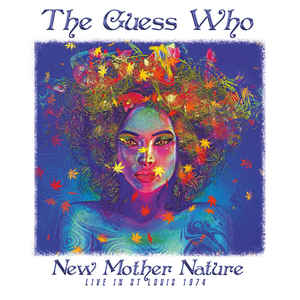
she hasn't got the faith or the guts to leave him
when they're standing in each other's way…
you know you've been wrong and it won't be long
before you leave 'em all far behind...
|
Editor’s note: I knew an aged couple, now passed on. He was well past 80. She would comment, a kind of boast, that every day he would say that he loved her. When I heard this, it just didn’t feel right, as they displayed no fervent mutual affinity. For example, he’d speak of accomplishments in his life, which prompted her to leave the table, unable to hear them one more time. All this drama, and with guests present, as well. I was talking to him one time, and the conversation turned to his ownership of a small but somewhat run-down house; a rental, he said, but the house was vacant. But then he confided the real nature of things. He said he kept that little house just in case he could no longer stand living with her one more day. It was his “get away” house. Now, those of us who are younger would think, “Well, this very senior couple gives the appearance of having learned the art of marriage congenialities. And, in any case, given their age, they would surely be well settled in for the duration.” But, not so. Even as he approached 90, he was still eyeing the exit, weighing the pros-and-cons of making a break one of these days, when he just couldn’t take it anymore.
|
Nancy Levin, Worthy: Boost Your Self-Worth to Grow Your Net Worth: “If I had believed in my own self-worth... If I'd known my value, I couldn't have spent so many years ignoring the whispering - and sometimes screaming - voice that told me to leave my marriage. For a long time, that truth was just too scary and painful for me to face. Talk about keeping my head in the sand! But how many years did I waste, postponing what has proven to be a much better life - simply because I went into hiding and didn't see that I was worthy of something better?”
|
|
Eckhart Tolle:
true love is transcendental; without recognition of the 'true self' within, there can be no authentic romance for couples

"What is commonly called 'falling in love,' in most cases, is an intensification of egoic wanting and needing.
"You become addicted to another person, or rather to your image of that person.
"It has nothing to do with true love, which contains no wanting whatsoever."
"True love is transcendental. Without recognition of the formless within yourself, there can be no true transcendental love. If you cannot recognize the formless in yourself, you cannot recognize yourself in the other. The recognition of the other as yourself in essence – not the form – is true love.
"As long as the conditioned mind [run by the 'false self'] operates and you are completely identified with it, there’s no true love. There may be substitutes, things that are called “love” but are not true love. For example, “falling in love”… [the] aspect of affinity with another form [in terms of] male/female. You can be drawn to another body in a sexual way, and it’s sometimes called “love”.
"Especially if the sexual act is denied long enough, it’s more likely to develop into obsessive love…so much so, that in cultures where you could not have sex until you were married, falling in love could be a huge thing and [if denied] could lead to suicide.
Editor’s note: This “obsessive love,” drawing strength from a puritanical forever-say-no culture, might not only lead to suicide if denied, a “Romeo and Juliet” complex, but to hatred and vengeance if one is rejected, or even perceived to be spurned, by a hoped-for lover. These extreme cases, by no means unknown, offer clear instruction that, unless romantic love is founded upon, what Tolle calls a "transcendental" awareness – even if the lovers are, in fact, destined as Twins, but without present spiritual maturity to recognize this fact – the “false self” will ruin a couple’s chances for authentic relationship. At least for now.
"Naturally, there is an affinity of the male/female, the incompleteness of this form. The primary incompleteness of this form is that you are either a man or a woman. The oneness has become the duality of male/female. The pull towards the other is an attempt to find wholeness, completeness, fulfillment through the opposite polarity, in an attempt to find the Oneness that lies at the basis of the attraction. It’s to do with form, because on the level of [outward] form you are not whole – you are one half of the whole...
"What is commonly called 'falling in love' is in most cases an intensification of egoic wanting and needing. You become addicted to another person, or rather to your image of that person. It has nothing to do with true love, which contains no wanting [that is, neurotic craving based on a sense of emptiness and neediness] whatsoever."
it's so easy to fall in love
Editor's note: Recently, a Word Gems reader asked a question about the nature of authentic romance. I said that the typical male, led by biological impulse, could fall in love ten times a day -- as Buddy Holly sang, “It’s so easy to fall in love.” And so meaningless, as commonly experienced.
Eckhart is right. The typical brain-chemical induced male-female ritual of “falling in love” is just a dramatic outburst, “an intensification, of egoic wanting and needing.” And if the right stimulus crosses one’s bio-radar screen, “falling in love” can happen very quickly – like a prairie fire rapidly consuming a field of grass, but then, just as quickly, burning itself out.
This is the ephemeral fervency that replenishes the human species, spawns marriages, and makes the world go round. But it’s also “the love that has a nasty habit of disappearing overnight.”
jaded
After thousands of pages in articles and books, why should I say more about love here? By now we are aware of the problem. Even so, I would like to add a paragraph or two because, while most of us know of the “miserably married,” few believe there is a solution. As “The Wedding Song” laments, most of us, jaded and disillusioned, no longer truly believe in love; not really. We might believe in the temporary high of “falling in love,” but not in the unquenchable, permanent joy of transcendent marital Twin love, the eternal happiness of darling companions. That sounds like a fairy-tale to most of us.
Even many of the spiritual teachers who know about the “true self” and the “false self” do not believe in the eternal marriage. They think that the joy of “going within,” of finding the inner peace, is the ultimate satisfaction -- and that those who insist on hoping for fulfillment with a romantic mate are just deluded, living in a fantasy.
ultimate reality
What I'd like to add is this; an answer that will satisfy few, at the moment: The true romantic love, “something never seen before” in this world, is an ecstasy unavailable to the individual. And why is that? It is so because the intimacy of the true marriage is meant to mirror ultimate reality, a microcosm of the Oneness known only to Mother-Father God.
This state of bliss is not something achieved once and for all, in a moment. It’s something that a Destined Two will grow into, will “travel on” toward, as "The Wedding Song" puts it, over the coming unending future; that is, they will progressively enter higher states of consciousness, and closer degrees of intimacy.
It’s something that has to be experienced, not part of "common sense." And until people do experience it, even the beginning phases, we will read of reports by some concerning how romantic love is just a fantasy to be outgrown and discarded.
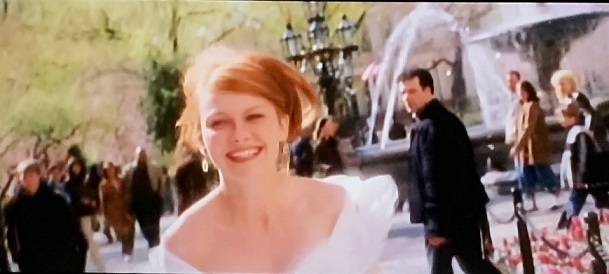
so magnetic, so overwhelming
However, as the ancient Spirit-Guide Silver Birch expressed it: the true love, which happens for each individual, for each couple, only once, whether in this world or the next, is "so magnetic, so overwhelming," as to forever displace all other feelings of pleasure; such that, this mystical experience will now, in a sense, define one's life, become a milestone in one's mental history, commemorating the time when one truly became alive, that is, with meaning, purpose, wholeness, and joy. It is the extreme delight which, once possessed, never leaves one's consciousness.
“it’s so easy to fall in love,” and “people tell me love’s for fools, but here I go breaking all of the rules” – because – “where you’re concerned, my heart has learned” that... it’s something new and different this time and no fantasy…
|
|
'a woman's heart is a deep ocean of secrets'
Titanic, the movie (1997)
| "I would rather be Jack's whore than your wife!!" |
Editor’s note: This defiant intent, if required, to be the “whore” of one’s beloved, than to be tethered to a soulless marriage is not unique. We find the passionate Heloise, the reluctant Abbess, declaring exactly the same.
In this world, we often marry young, even before our brains are finished growing [at age 25], and for the wrong reasons. And now, suddenly finding oneself enmeshed in duty and obligation, it is not unknown for women, coming into a maturer view of “what ought to have been,” to harbor a perspicacious wisdom born out-of-time.
It will yet find its realization, but in another world; until then, “a woman’s heart is a deep ocean of secrets.”
|
|
“Why can’t I find my forever-soulmate?”
Many of the concepts introduced here on Word Gems are controversial, but none more so than that of finding true love.
People often feel that I am incorrect to say that true love is a most rare commodity in this world and virtually none has experienced the real thing.
There are different ways of approaching this problem. Tolle uses the phrase “True love is transcendental,” that all true love is of God. And I sometimes say that love must be founded upon a recognition of the “true self,” one’s link to Universal Consciousness. All these, variantly expressed, refer to the same thing, and we should not be terribly surprised to learn that authentic love will not be found on every street corner in this troubled world. We delude ourselves to suggest otherwise.
“falling in love,” in most cases, “is just an outburst of egoic needing and wanting”
We don’t like talk like this. We want to believe that what we felt, in those moments of ecstasy – albeit, rare and so fleeting in one’s life experience – at least should be counted as real. We protest against charges that might diminish. But, we have to admit, almost everyone, or let’s just say ‘everyone,’ though in receipt of these feelings, has not found lasting happiness. Therefore, we are forced to concede the question, "What is the real problem in this process? - or, with us?"
let’s take a wider view
When we say that “true love is transcendental” or “of God” or, if it is to endure, must be based on “Universal Consciousness,” we confuse ourselves to limit a quest for authentic love to the arena of the romantic. In other words, all forms of love, in every aspect of human interaction, will eventually break down and disappoint, if not sustained by the “true self.” All forms of love, if orchestrated by the “false self,” are merely expressions of “egoic wanting and needing.” Let’s look at several examples.
a mother’s love
Well, who could question a mother’s love? It’s virtually sacrilegious to do so. We even have popular proverbs affirming the sacrosanct status: we speak of “it's as American as motherhood and apple pie,” meaning, these are unassailably and intrinsically wholesome and inviolable. However, in my travels and discussions with people, I am surprised how often I come across people who have been traumatized and scarred by unloving mothers.
How does this happen? Even though “motherhood” is a natural and sacred function, if led by the dysfunctional ego, “motherhood” might devolve to just one more role that the ego plays in order to get what it wants. The egoic mother wants to be wanted. She’s that young "Mary" who entered marriage because “it just felt so good to be chosen” and not “left on the shelf.”
In similar vein, when children come along, the egoic mother revels in being needed in this new and special way; never in her life has another human being needed her so much, and it feels so good to be in such demand. At this stage, all is well in paradise. Mary has an adoring captive little audience, dreamed about since she was a young girl. However, as little Johnny or Suzie grows up, and begins to have a few thoughts of his or her own, mom can feel very threatened by this insubordination.
Suddenly the once-cuddly child is not so precious anymore. Johnny and Suzie no longer need mother as much, less so with each passing day, and now dear mom feels her job security draining away. Who will she be, she subliminally worries, "if I’m no longer needed as a mother?" She needn't worry. As a human being she enjoys a vast, uncharted human potential by which she might express herself; however, quite dysfunctionally, her sense of self-worth has attached itself to a temporary narrow role she's playing; that of, “dutiful loving mother.”
the new unpardonable sin
If a mom is not very careful, she might begin to see her own children as threats to her identity, to the role she’s been playing; and, in severe cases, as she feels more and more rejected as the child grows up and doesn't need her as much, she might become a life-long enemy to the child, whose unforgiveable sin had been that of maturing to adulthood.
all egos want something from you
We’ll look at some other examples, but let’s remind ourselves of what we’re up against. All egos want something from you. We use the phrase “egoic.”
This means that every thought and deed of the ego is tainted with an aspect of “self.” Other people are mere supporting players in a drama starring the ego; other people are evaluated in terms of “How can you enhance, add to, or support my sense of neediness?”
When the other person “fits into my life story,” the "narrative of what I need," then the ego will offer the adulation of “I love you” or “we’re friends” or “you’re a good little boy or girl,” but the moment the enhancement ends, now you’re deemed to be a threat to the ego's fragile sense of self.
high school friends
Twenty-five years ago when my daughter was a young teen, I recall having a conversation about her friends at school, especially one good friend. She believed that her special friend would always be in her life.
Feeling the need to offer a word of balance, I commented that most high school friends drift apart after graduation. This seemed a foreign concept to her. However, almost immediately after commencement, to her great dismay, the special friend no longer wanted to be friends.
It seemed that she’d decided to adopt a lifestyle which, it was imagined, would be condemned by my daughter; consequently, the once-special friend not only drew back but assumed a position of animosity.
respected teachers
In high school I had taken a class from a particular teacher for three years. In my senior year, recognizing a schedule-conflict, I decided to break with this regimen in favor of studying physics.
Editor's note: This makes me smile. I didn't actually study physics, I mean, not so much. I attended class and pretended to be a physics student. My time of on-fire desire to study was still a few years away.
And I recall what happened next. I was sitting at a table in the lunchroom, filling out forms for the new school year's classes. The teacher in question, with an air of seeming friendliness, strolled by and stopped by my table. I informed him that I couldn’t be in his class this year. Upon learning of my “betrayal,” saying not a word, he immediately spun around and left me. For that entire coming year, he treated me as pariah and never looked at me again.
when you change your life-views, be prepared to lose your friends and family
Cult religions, cult politics, too, employ a technique of “shunning” if you dare to disagree with the status quo. If you become a thinking person, and begin to see alternative answers to ones subscribed to by those around you, you will become a threat to their world-paradigm.
|
more than drinking the koolaid
The long reach of cultism encompasses much more than crackpot churches. The root idea of cult offers the sense of "cut." This core concept of "cut" leads us to images of refinement and refashioning and, by extension, development, control, pattern, order, and system.
Cultism as systemization finds a ready home in religion and philosophy which seek to regulate and redistill the patterning and ordering of ideas. However, in a larger sense, the spirit of cultism extends to every facet of society. We find it scheming and sedulously at work in politics, academia, family, corporations, entertainment, science, artistry – anywhere power might be gained by capturing credulous and fear-based minds.
See the “cultism” page for a full discussion.

|
Family and friends will now flee from you and your poisonous ideas. In times past, you might have been near and dear to these loved ones, but, for most of them, almost all, you will now be counted as virtual agent of Satan. You’ve become a walking billboard, a continual reminder, to them of their lack of critical thinking and unwillingness to grow as a person; and they will hate you for this.
"To go against the dominant thinking of your friends, of most of the people you see every day, is perhaps the most difficult act of heroism you can have." Theodore H. White, The Making of the President 1960
in her head, she was already cutting the cake
In one of the featured vignettes of “The Perfect Mate,” the “Lincoln and Mary Todd” story, I offered dialogue between Kairissi and Elenchus which might add to our present discussion:
K. Women led by the ego and biological impetus can be just as scheming and disingenuous. John, at times, in his bio-madness, is consumed with the craving to plant seed; but Mary is just as neurotic and driven to want to nurture that seed. All of this works well to perpetuate the species, and Mother Nature is very pleased with the proceedings, but Madame Destiny is appalled by this tawdry display and proclaims that none of this, fundamentally, has a particle to do with true love.
E. The author told me a story or two from his younger days that supports what you say. At age 18, upon graduating from high school, he visited a boy-cousin in another state. The cousin arranged a double-date for them. The author’s date was a fine and pretty girl, smart, a good student, on her way to attend college in the fall to become a nurse; even so, he felt no compelling attraction toward her. Having attended a movie, at the end of the evening, upon dropping her off at her house, with a “good-bye” kiss on the cheek, she then asked if they might write to each other. Half-heartedly, in politeness, he agreed. And she did write, and the letters were perfumed, as she spoke of the future suggestively. After a couple of these letters, discerning the imbalance of affections, but not in her favor, he forwarded, as politely as he could, his indication that they should no longer write. To his utter shock and great dismay, he received a reply most venomous, laced with threatenings and slaughter.
K. (sighing) She’d spent only three hours with him, decided she’d won the lottery, and had already set the wedding date and was even cutting cake. She really didn’t care so much for him as a person but only as a stepping-stone to that “good and well-ordered life” she’d been programmed to want.
E. He recounted another incident in high school. A classmate was infatuated with him, but he did not recall ever even speaking with her. She crafted a plan to be alone with him. One night, after a school function, as he was driving away, another car pulled up alongside his. An upperclassman and his girlfriend were in the frontseat and in the backseat was the girl-with-an-invitation. The driver asked him if he wanted to park his car and avail himself of the awaiting company in the backseat. He declined the generous offer and drove away. However, the inviting girl, mightily slighted by this rejection, became a lifetime nemesis.
K. (sighing) Look how easy it is to enrage a thwarted ego. You can be minding your own business, just trying to live your own life, but when “Mary Todd” comes calling, trying to get you into bed, and you don’t want to play, now you’ve made an enemy for all time.
That’s right. You really don’t have to do anything to make a lifelong enemy of an ego. All you have to do is to fail to give what that ego wants. That’s more than enough to hate you with a special hatred.
“Why can’t I find my forever-soulmate?” is really the wrong question. We need to cast a wider net and also ask, “Why can’t I find the eternal best friend, or the eternal motherly love, or the eternal good neighbor?”
Do you see? Every aspect of human interaction, sooner or later – and probably sooner rather than later – will break down if it’s managed by the dysfunctional ego.
The ego can’t help itself. It’s deep sense of neediness – the “I don’t have enough” because “I am not enough” – makes it insane. It embodies Jesus’ dictum, “They know not what they do.”
Every thought and deed of the ego is laced with “How can you fit in with my story, how can you add something to my sense of incompleteness, how can you strengthen the role I’m playing which is designed to get what I want?”
Those who play along with the schemes of the ego are classified as "lover" or "good friend" or "good child" or "good student" or "good church member"; but those who fail to enhance the ego are shunned, hated, black-listed, and vilified.
Editor’s note: Adrian offered a comment:
Every addiction arises from an unconscious refusal to face and move through your own pain.
“The concept of the counterfeit comes up time and time again in Gnostic thought. It seems that falling in love has its counterfeit too when we look to others to assuage our inner distress. We place a heavy burden on them to make it better, and, when it fails, as it surely must, we blame them (and outer circumstances in general) for that failure. It seems there is no escaping the need for solitude, for in solitude we acknowledge responsibility for outer circumstances [rather than blaming] other people [who] are not doing something [which, we believe, makes] us unhappy. The unhappiness is there already, circumstances only reveal its presence. Then we get mad at the circumstances, missing the point. It must be disappointing for the ego to admit. [It believes: once you] get yourself figured out, then you will find right relationships. The ego insists that finding the right [and perfect] relationships will sort things out. [This is illusion, but] this [principle] could be applied, I think, to any ‘if only’ proposition: ‘If only I had more money, if only I had etc., etc.’”
While this is very hurtful to experience, it’s also rather predictable: you can always count on the ego to advance itself at your expense: "The ego has no friends or lovers, only accomplices."
Editor’s note: And this is why it’s a truism that any dysfunctional ego, if sufficiently threatened and blinded, is potentially capable of any – yes, any – crime or atrocity ever committed in history. To see this bottomless pit of potential depravity is the beginning of true spirituality and the end of all elitism, of “I thank thee Lord that I am not like other men.”
Is everyone insane?
We’re reminded of the old joke of the aged Quaker couple. He says to her, “All the world is mad, Martha, but me and thee; but, sometimes I wonder about thee.”
This is funny. But as I recount the litany of transgressions against me over the years, I must hasten to remind myself that I too, at times, have served as antagonist to others. There is a saying, and a true one, “A good man spends the second half of his life making up for the sins of the first half.”
Nevertheless, regarding the question “Is everyone insane?” I must offer a counterbalancing view. Yes, most people in this world are ego-insane, and await a better day of enlightenment; however, sometimes, not very often but sometimes, we’re shocked, this time, by something positive. Here and there, people do arise from the madness of the crowd; here and there, people do “come alive” and learn to live from their sacred centers.
When it happens, we remember it all of our lives, as a source of joy and wonderment. I’m thinking of one of my relatives, in her old age, who offered me a mother’s love, and I knew it was genuine, and could never be mistaken as to its authenticity; and I recall another relative, an older man, who, in his old age, treated me like a son, was proud of me and rejoiced in me, and I could never be mistaken as to the authenticity; and I remember a classmate, who I’d not seen in a long time, who offered me genuine warmth and acceptance as a person, as she praised me for certain things of the past.
We are shocked at these occurrences of true love and do not expect them in this world where the ego dominates; but, when they happen, we are given a foretaste of life in the “real world,” a life of authentic love, on all levels of human interaction.
There is a story of Jesus in the New Testament. He’d been creating a stir with his controversial teachings, and someone said to him (paraphrased),
“Your relatives are outside – your mother and your siblings -- demanding to see you, to take you away. They’re embarrassed by you, and believe that you should be shut down. They say you’re crazy.” Jesus responded with, “Who is my mother and my siblings? I will tell you. My true mother and my true siblings are those who share my spirit; and these outside do not thus share, and have no part in me.” (compare Mark 3:21 and Matthew 12:47-48)
Yes, some or many, even those very close to Jesus, said he was crazy. But "inmates running the asylum" is the norm in this world.
“Why can’t I find my forever-soulmate?”
This is what people really want to know. All the other loves are important, and we won’t ever want to give them up, but the love of the Sacred Beloved is “what we stay alive for.”
Why can’t we find her?
You might be saying, “I’m ready to be with her. I understand the evil of the ego, and I guard against it. So, is this not enough? Why can’t I find her?”
The issue is complex. She might not even be in this world; you might have to find her over there. Or maybe she is here, and you were around her at an earlier time, but you were too ego-insane then to recognize her. Or maybe she’s around you now, but, for the same reason, you cannot presently perceive her secret identity.
But, even if you are one of the few, right now, to have “eyes in your head,” this doesn’t mean that she’s presently ready and “sane.” She might not know you, or want to. Or, if she does know you, she might even hate you. Remember, the ego doesn’t need a good reason to hate someone; anything, some perceived slighting or threat, can set it off. And so the answer to “Why can’t I find my forever-soulmate?” is not so easy to negotiate.
And now you will want to ask another question.
“Can the coming-to-sanity process be augmented or speeded-up?”
The short answer is no. We’re talking about the soul "coming alive,” coming to better levels of awareness. The soul has its own timetable for awakening. There’s nothing you can “do” to trigger a greater sense of “being.”
The fact that you are reading these words might indicate that the “germination” process of the “seed” of the soul is likely under way. But not necessarily.
Many people approach spirituality as one more item on a to-do list. They want to work at it. A lot of trying-very-hard and gritting-of-the-teeth, a straining to come alive. The ego loves “doing” and cannot comprehend a relaxing into “being.”
I state this merely to highlight the systemic difficulty. But even this view is wrong. There is no “difficulty” in coming alive, just as the sprouting seed has no “difficulty” in sending out the first shoot. It just happens naturally, with no “German farm-boy” effort required.
However, all this aside, if your interest in these things finds itself burgeoning, you may very well have entered your time to “come alive.” If so, you must wait for your “better half” to awaken, as well.
In the meantime, your task will be that of strengthening yourself in terms of sanity. Just because the ego, for you, is down for the count, doesn’t mean that it won’t try to take you over, every day. Some days it will win, and you will feel discouraged, but you must start again. The mental habit patterns of egoic thinking, fortified over a lifetime of constant reinforcement, will not give up without a big fight.
keep coming at you
These temptations toward egocentrism will keep coming at you, and keep coming at you, with vigor, for some years to come. You will need to become mindful of the ego's wiles, as it will often seek to take you over, and back under, to the old ways of self-centeredness. Its forward momentum is very hard to slow down. It will take years of dedicated spiritual practice, of purposefully remaining "present" to your "true self," to substantially neuter it.
And so, do not think that you have nothing to do until your Sacred Beloved comes. You have plenty to do; not just for yourself, but you'll need to strengthen yourself for her, as well, in advance of that day when the Spirit Guides finally deem you ready, mature enough, to enter the anticipated eternal life of love.
At the right time, for all concerned, the Guides will bring her to you -- with your first order of business, probably, that of helping her to overcome remaining vestiges of ego-insanity: the fears, the self-loathing, the sense of not-enough. It will be difficult. It's unlikely to be all "hearts and flowers" from day one; but, she will finally be yours, you'll finally be with her, and will be glad of it, on any basis.
Elizabeth and Robert
It will be as Elizabeth said of Robert,
Do you know that … I was frightened of you? … I felt as if you had a power over me and meant to use it, and that I could not breathe or speak very differently from what you chose to make me... But the power was used upon me – and I saw … very early … that you had come here to love whomever you should find [no matter my faults or imperfections, as you loved these, too; you loved me "not for a reason"; further, my early attempts at self-effacement and deflecting your love] had just operated in making you more determined [to reach me]…
And so, she will arrive. The ancient Spirit Guides will finally honor your prayers to be with her, your long dreamed-about "forever-soulmate."
They say that you will be her "Wisdom"; that you shall love "whomever you shall find, no matter the faults and imperfections," and that you will have a "power over her" to reconstruct a battered sense of self, by encouraging and cherishing her; they say that you will "draw life and give it back again," and now you know what this means.
|
|
John-and-Mary romance as instinctual response
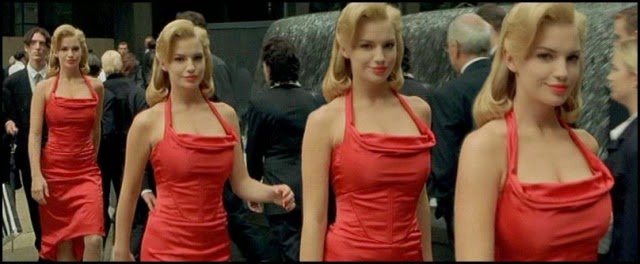
Fiona Johnson, "The Girl In The Red Dress," The Matrix (1999)
supernormal stimulus
Nikolaas "Niko" Tinbergen (1907 - 1988) was a Dutch biologist and is regarded as one of the founders of ethology, the study of animal behavior. His findings, much of which is reported in his seminal writing, “The Study of Instinct” (1951), would earn for him a Nobel Prize (1973).
Among the many animal-behavior discoveries, Tinbergen, along with fellow researcher, Konrad Lorenz, learned that the color red often plays an important part in the mating process.
A particular focus of Tinbergen’s study centered upon what he called the “supernormal stimulus.” This precept would manifest in the construction of an artificial object imbued with a stronger stimulus for an instinct than one supplied by nature. This will become clear when we consider the following interesting examples:

stickleback sees red
The red-underbellied male stickleback, in its territorial protestations, will normally attack other sticklebacks when it sees their red. However, Tinbergen made cardboard versions of the fish, but without great attention to detail, except for the red underside which was painted with more red than found in the real fish. The territorial males mounted a more vigorous attack upon the cardboard fish with the “supernormal stimulus” -- or even against a lump of wax with a red stripe! -- than against the real stickleback intruders.
Editor's note: Tinbergen gained an initial clue as to the secret motivations of the stickleback when a randomly-passing red postal truck caught the attention of the fish in the aquarium, producing an attack-posture!

robin red-breast
A male English robin, in autonomic, stereotypical behavior, will ward off fellow males who venture into his territory. (As I commented to a friend, this is de rigueur on "Animal Planet.") Tinbergen put this stimulus-response to the test by constructing two models: one was simply a tuft of feathers with a bright red stripe (on the left), with the other, a well-crafted and detailed robin but with no red breast (right). The territorial males ferociously attacked the nameless red tuft but gave a pass to the smart-looking mannequin robin.
paper-butterfly dreams
A similar example, Tinbergen made paper butterflies but with exaggerated, more-defined sexual markings. The male butterflies chose the “super-stimulus” paper dreams, moreover, tried to mate with them! while the real-deal butterfly ladies were left idling on the bleachers without a dance partner.
Tinbergen outlines many other examples of programmed animal behavior in “The Study of Instinct,” and you’ll want to check it out.
Mother Nature vs. Madame Destiny, Bio-Man vs. Spirit-Man
What are we to make of sticklebacks set-to-war by the passing of a red postal truck? - possibly, Fiona was driving it. Or paper-butterfly dreams, with attempted enactment, while your none-too-happy true love files her nails?
In all of the above examples, Mother Nature scores big. She gets what she wants: the perpetuation of world species. However, as Kairissi and Elenchus discussed, Madame Destiny, for those creatures endowed with a “made in the image” soul, requires something more.
Bio-Man, also well known as “John,” is a thinking animal; but nothing more. He would love to mate with as many females as he could get away with. On the animal level, this is quite normal; all creatures on God’s good Earth are impelled to do this, and Mother Nature loves it.
|

Should you fight and compete, joust for the fine maiden’s handkerchief?
Editor's note:
On “Animal Planet,” as we’ve seen, “faint heart never won fair lady,” and the way they do it down in the fur-and-feather world is to puff your chest out, make some screech bird-calls, do a rain dance, wave the coat-of-many-colors, and if you’re the last tuft-of-fur standing, you might enjoy fulfillment of your paper-butterfly dreams.
But let’s say you’re beginning to leave behind the unsubtle ways of Bio-Man, beginning to see things more clearly, and you might even have an inkling who your eternal Twin is. Should you do battle for her?
In this vein, many years ago, a Word Gems reader wrote with a question, would I try to convince someone I love, with pleading arguments, to stay with me if she wants to leave? My general answer was, no, I wouldn’t fight for her, and I wouldn’t plead with her to stay. I might be devastated at the loss, I might be desperate for her to remain, but if she thinks she wants to be somewhere else, then it does no good to corral the body while the mind is at large.
There is a time to make one’s plain and clear profession of interest toward a potential mate. But to become defensive and territorial, to “attack the tuft of feathers with a red stripe,” is to demean the sacred process of authentic romance.
Here’s the deal. Let’s say she is your destined mate, but if she’s not ready to be with you, if her state of mind is presently clouded and befuddled with all manner of egoic concern, then you'll have to wait for her day of enlightenment. Spirit Guides on the other side work with darkened minds “for a living,” so they know all about this, and they absolutely do no pleading and arguing. Instead, they allow the hapless of the Dark Realms to stew in their juices, to experience the full force of what they’ve errantly chosen, until they've had a belly full, until suffering grows to such an intolerable peak as to prompt a change of heart.
Every true mate, with “eyes in his head,” must apply these principles as he waits for his only one to acquire a better point of view.
Also see Spirit-Guide Silver Birch’s discussion on how it’s not possible, that there's no such thing, as unrequited love in the kingdom of God. Time is on the side of the true mate, and all good things will yet come to him who waits in a spirit of knowledge-based faith.
And it doesn't matter how much an opponent-rival might puff his chest out. See Spirit-Guide Margaret's description of a once-arrogant chest-puffer, now deflated and languishing in "the rat cellar."
|
devil or angel, do whichever you are, love me or leave me...
|
Kairissi. So, buddy, would you fight for me and plead that I stay?
Elenchus. I don’t think that strategy works out too well.
K. It does appeal to a girl’s vanity, though.
E. I’ll give you that, but think about what happened to us a long time ago.
K. I guess I sort of was the one who was doing the pleading.
E. You did nothing wrong, and I admire you for your bravery in coming to me. But I was too young, still shooting bee-bee guns and reading comics.
K. (small smile) But not “Betty And Veronica.”
E. That’s right, not "Betty And Veronica" - but you did. (sighing) In these matters, you were a typical precocious girl, far ahead of a typical boy. You tried to make me understand something.
K. But your warp-drive wouldn’t even be installed until Tuesday.
E. Pretty much. And so I didn’t really get what you were talking about. If you had waited, biding your time, just another couple years, until I had a chance to grow up a bit, the ensuing decades might have unfolded differently. However, we’ve been over this and over this and now see that we needed to be apart for a good while in order to learn some hard lessons. But the point is this. I wasn’t ready. And no amount of discussion, encouragement, cajoling, or even pleading – but you didn’t plead – would have made any difference.
K. I didn't plead, I just shared my joy. And then later in life, in a sense, we sort of switched roles and you became the one, in effect, trying to move me to action; subtly, not overtly, yet forcibly. But then I was the one who wasn’t ready. And no amount of directed activity with a view toward moving me off “high center” was successful.
E. True love must be free, a free-will offering, from each to the other. People must be free to follow their own hearts and best judgment, even if that judgment for a time is skewed and led by the ego. If it is, they’ll learn from their mistakes and then will discover what’s real and true.
K. We’ve talked about this before, Ellus. There is no such thing as true love without problems. As Shakespeare said, “the course of true love never did run smooth.” Even if two share a love “made in heaven” and are destined to be eternal romantic mates, it’s not going to be easy coming together. People mature at different rates, do not enter the race seeing eye-to-eye, and we need look no farther than our own history to learn how this works.
E. (sighing)
K. I’ve always liked Bobby Vee’s classic “Devil Or Angel,” and there's a line in the song which encapsulates much of what we’ve said here: “love me or leave me, devil or angel, do whichever you are.” He doesn't want her to leave. He tells her he misses her, needs her, loves her, but, if she’s of a mind to go, then leave today, and get it over with. And when you go, when you’re out there, doing what you think will make you happy, then you’ll find out if what you had was real or just illusion, whether you made the right decision.
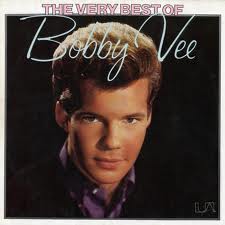
|
Madame Destiny versus Mother Nature
Madame Destiny is not so impressed with the tactics of Mother Nature. Most so-called romance in this world is just instinctual, biological impetus on a romp. The unenlightened male, Bio-Man, reacts to the super-stimulus of “exaggerated and well-defined sexual markings” just as any beast of the field.
believe me, Mary Lou, I just had no choice, though I never did meet you before
 |
- Hello, Mary Lou,
- Ricky Nelson
passed me by one sunny day, flashed those big brown eyes my way, and, ooooohhhh, I wanted you forevermore, though I never did meet you before, I saw your lips, I heard your voice, believe me I had no choice, that's all I had to see for me to say, hello, Mary Lou, good-bye heart...
|
it's just bio stimulus-response, nothing to do with real love
And if John and Mary enter into marriage on the basis of this sort of threadbare, impoverished, beggarly, shallow view of life and love, they should not expect more than that hoped for by any of God’s animals - which is, five seconds of pleasure and you’re all done, Mary Lou. Welcome to “the love that has a nasty habit of disappearing overnight.” But, in our saner moments, we already gathered that it really wasn't love at all, was it.
Editor's note: The ancient Spirit Guide, Silver Birch, concurs. Somewhere in his channeled testimonies, he remarks that the marriages of this world are but evanescent expressions of "instinctual" behavior, which cannot survive transition to the next world.
However, a day will come when Bio-Man learns of his "true self"; in fact, if he is willing to accept, he will come to perceive this other truest part of himself to be the majority interest -- Spirit-Man.
Madame Destiny waits for us to realize that we are more than boiling brain chemicals and fevered hunger, more than biological impulse leading the prize bull and his heifers in the summer pasture. We can choose to override the rabid, frenetic desires of Bio-Man, in favor of waiting for one particular lover, with whom we shall yet share all of eternity.
Mother Nature's a clever girl, she relies on habit...
|
Bobby Darin and Sandra Dee, the hottest couple of the early 1960s. Bobby wrote and sang Multiplication with its very clever lyrics.
|
-
Bobby Darin,
-
Multiplication (1961)
multiplication, that's the name of the game, and in each generation, they play it the same, when you see, a gentleman bee, 'round a lady-bee buzzin', just count to ten, then count again, there's sure to be an even dozen; now there were two butterflies, castin' their eyes, both in the same direction, well, you'd never guess, that one little yes, could start a butterfly collection; when a girl gets coy, in front of a boy, after three or four dances, you can just bet she'll play hard to get, to multiply her chances; now, your Mother Nature's a clever girl, she relies on habit, take two hares, with no cares, pretty soon you got a room full of rabbits; parakeets, in between tweets, sometimes get too quiet, uh oh, but have no fear, 'cause soon you'll hear, a parakeet-riot, just try it...
|
 |
I very much like how Dr. Joseph Campbell expressed this sentiment. He was discussing the message of the Troubadours, that of, one particular woman loving one particular man:
MOYERS: So love is not love in general, it is love for that woman?
CAMPBELL: For that one woman. That’s right… Marriage is recognition of a spiritual identity. If we live a proper life, if our minds are on the right qualities regarding the person of the opposite sex, we will find our proper male or female counterpart. But if we are distracted by certain sensuous [biological] interests, we'll marry the wrong person. By marrying the right person, we reconstruct the image of ... [Mother-Father] God, and that's what marriage is... I've been amazed at the number of my friends who, in their forties or fifties, go apart. They have had a perfectly decent life together with the child, but they interpreted their union [only] in terms of their relationship through the child, [not] their own personal relationship to each other... Marriage is not a simple love affair, it's an ordeal, and the ordeal is the sacrifice [the death] of ego to a relationship in which two have become one."
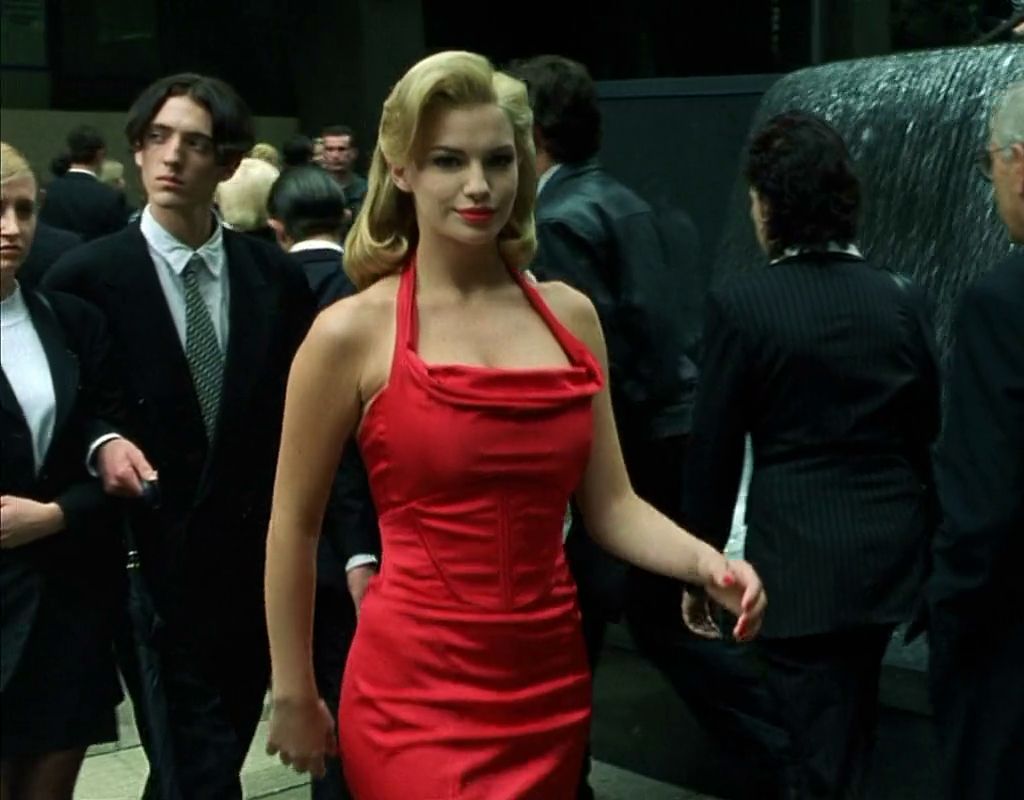
Editor’s note: I very much like Dr. Campbell's assessment: spiritual marriage is the death of the ego in favor of the intimate oneness.
There’s nothing wrong with biological impulse, nothing wrong with enjoying animal pleasures, and there's a lot of it in Summerland. But it won’t turn out well for him until sexual union pictures the grand divine archetype; until he finds that one, that only one, that particular “girl in a red dress,” upon whose heart and soul his name is indelibly inscribed; and hers, upon his -- inscribed in red, of course.
|
|
Emanuel Swedenborg comments on those who appear to be alike, appear to "be made for each other," but are only assumed semblances
"[Their] conjugial covenant being ratified for the term of life, but the affections, based externally, have a duration of days."
Swedenborg is saying that marriages of this world, ostensibly entered into for a lifetime, are based upon external considerations, and therefore attendent affection cannot enjoy but limited duration.
inwardly cold and disagreeing
"They [the John-and-Mary lovers] are called assumed semblances, because they exist with those who disagree in mind, and who from such disagreement are interiorly cold."
The assumed semblences give an outward appearance of love, of being alike, but are inwardly cold and at odds, secretly wishing to be apart.
compare "assumed semblances" to the hidden "inwrought adaptation," the "secret likeness"
Andrew Jackson Davis:
"... to the lover, the one beloved is the most beautiful; because there is felt an inwrought adaptation of desire to desire, impulse to impulse, organization to organization, Soul to Soul."
"... of the spiritually married, it may be said, that their tastes are not the same; their opinions rarely accord; their outward inclinations seldom entwine each through the other; yet, in the centre of each soul dwell kindred mysteries, drawn from the one divine source; a secret likeness, so to speak, which attests the same nature, however differently modified by external circumstances."
In other words, in the true love, we experience a sense of "soulmate, myself."
|
|
love that awakens the soul

|
“The best love awakens the soul, makes us reach for more, plants a fire in our hearts, and brings peace to our minds.”
|

|

|
Why do family members, old friends, and romantic mates drift apart or even abruptly split?
When my daughter was in high school, she had a girlfriend; the two seemed inseparable. Later, the friend chose an alternate lifestyle, assumed that she’d be judged, then abruptly, and permanently, broke off friendship ties.
An example of my own: In the “Evolution” article I recounted that in senior-high English class I’d delivered a speech on the subject of “Creationism versus Darwinism.” Almost all of it, as I now perceive, was error. However, a good friend since childhood disagreed, summarily rejected me, and put me away with no reconciliation.
the hidden cause of all conflict
Each of us, likely, could offer scores of such examples. Krishnamurti’s teachings on the ego – concerning dualism, fragmentation, separation, division – are not of mere academic interest only to professional philosophers. This information holds the sacred key to understanding why planet Earth is the stage for war and conflict, not just on the international level, nor solely with religious or political groups, but also among family members, friends, and lovers.
Why do people drift apart or become immediate enemies? The short answer is that they become an offense to each other. People identify with, make themselves equal to, belief systems which, they assume, will "make me happy." They say "this is who I am," and "this is what I need to be safe and happy," and if you represent something different, their self-image will be threatened, their prospects of safety and happiness will seem to fold - and then you'll be rejected, no matter the strength of former bonds of amity. You'll be rejected because, don't you see, it's a matter of life-and-death to the ego.
the carefully crafted self-image
In his 17.December.1969 lecture, Jiddu Krishnamurti offers one of the most clear and insightful explanations concerning the inner workings of this dark dynamic. When we feel offended by someone, he said, “there is an image about yourself,” one that we ourselves build. This ego-image reflects one's cultural “conditioning.” Why do we build this image? We do so “as a means of security ... of protection ... of being somebody.”
fear is behind the curtain
And what do we find if we draw back the curtain of this ego-image? “Now, if you go behind that," Krishnamurti says, "you will see there is fear.” What is the composition of this fear? It is the existential fear of "I don't have enough" because "I am not enough."
Let’s analyze this ego-image more closely. Why do we build it? What are we protecting? If we allow ourselves to become very still, if we taste and sample the nature of this hidden fear, we will find that we’re protecting a self-image, a mental projection of what the ego would like to be and have:
“I am the person who needs to be seen as virtuous, respected, worthy of honor. And it goes without saying that I know what’s best for you.”
“I am the person who needs to be seen as right and correct. As such, I need you to believe as I do, to agree with all of my religious superstitions, and my self-serving political views. I need you to accept all of my inflexible opinions because your assent makes me feel, not just safe and secure but, that I’m worth something.”
“I am the person who needs to be seen as successful, 'in the know,' and winning. I want you to be impressed with what I am and what I have so that I’ll be counted as a somebody. I need these merit badges so that I can face my peer group, family, and community and be considered important."
“I am the person who craves to be viewed as a wise person, an in-demand friend, a counselor with ‘the answers.’ I count on you to offer me this prestige so that I can feel good about myself.”
"I am the person who grew up on the 'wrong side of the tracks.' My family culture held great disdain for education and knowledge. This disrespect for anything truly progressive has always held me back, creating for me a self-image of 'I’m not smart enough to succeed. I can't get a high-paying job, that's for other people.' And so if you come to me and suggest that, in fact, I do possess talents and strengths, then I will feel very uncomfortable, begin to panic, as you attempt to lead me out of my dysfunctional comfort-zone. At the first sign, with your help, that I I could actually advance myself, I’ll fall apart, swoon in terror, and then begin to blame you, and hate you, before I retreat and crawl back under the safety of my rock."
"I am the person who is comfortable with present ideas. They've gotten me this far (sort of). And they may be half-baked, a straw-house of illogicality, but, even so, these irrationalities offer a certain veneer of meaning to my life. In support of this charade, I surround myself with so-called friends with whom I share a tacit agreement, an unspoken pact: 'You must agree never to point out the non sequiturs of my beggarly superstitions, and I will agree to act as if I accept yours.' That’s the conspiratorial deal. However, if you come along with hard empirical evidence, well-reasoned positions, and suggest that I might want to take a more honest approach to what I believe to be true, well then, I will have to hate you for upsetting the applecart of my entrenched and time-honored unreasonableness."
"I am the person who carries on the traditions of my family. Unfortunately, these are more like peculiar shibboleths, marks of tribal distinction, but not of honor and dignity. I feel duty bound to ask, “What would mother do?” or “This isn’t the way dad did it.” I don’t have enough self-respect to live my own life, follow my own insights, quest for my own meaning and destiny. And if you come along and encourage me to think for myself, to break the apron strings (years after mom passed on), I will feel frightened, disoriented. And then I will blame and hate you for pushing me toward autonomy, full personhood, and self-realization."
“I am the person who needs you to make me happy. You can be my friend/lover/relative if you do exactly what I say and think just as I think. Anything less than this will be threatening to 'who I am.' I need you to love me -- just as I am, with all of my soft-underbelly beliefs -- to compliment me, to defer to me, so that I can judge myself as ok. Don't let me down, I warn you.”
“I am the person associated with you, and if you disappoint me, if you fall short of my expectations - especially after all I've done for you - if you fail to make me happy, if you begin to take on contrary opinions, then you will become an opposing force to what I want and to the image I’ve created for myself. If any of this happens, then, of course, I’ll have to get rid of you, even though we’ve meant much to each other over long years. I'll have no choice but to shun you.”
And so if anyone – sibling, friend, lover, child, parent -- stands as opposition to any of these ego-images, then the offending person will immediately be counted as an enemy, no matter a long history of cordial relation.
a closer look at the hidden fear
We find there’s more than one curtain to open. The ego’s need to be seen as right, virtuous, properly religious or political, is not the only hidden agenda. As one pierces the levels of self-obfuscation we discover the core terror which vivifies all of the ego’s activities. It’s the fear of death. This is the central terror, as we learn from the great psychologists.
This means that when one is attacked, there may be purported surface issues, but the real reason people rage and become apoplectic is the ego fighting for its life. It's identified with, made itself equal to, being right, virtuous, and all the rest, and if it fails to promote itself with these "images," then it will face a kind of psychological death. “Who will I be?” it asks, if these false-security images are minimized or taken away?
the high cost of following the truth wherever it leads
All this is most dire. The reality is, if you assiduously pursue the truth, no matter the cost or where it might lead, then you will lose (for a time) almost every last person who was once close to you. Why must it be so? - because you will become a living, walking threat to another’s carefully crafted self-image.
narrow gate, without fellowship
Editor's note: In his writings, Andrew Jackson Davis warns of the "narrow gate" that leads to life; few be that enter it. Those who live courageously by following the truth wherever it leads, as Davis points out, “will walk a pathway without fellowship of thy earthly brethren.” The cults have long employed the weapon of excommunication, shunning, and ostracization - a forced separation from friends, workmates, and family - toward anyone who disagrees with the hive mentality. This putting away occurs not just in religion but in dysfunctional families, corporations, academia, politics, and other power-seeking groups. They’re afraid of contrary opinion which might disembowel and expose shallow teachings. And so they’ll get rid of you for spreading "misinformation"; and you, as a truth seeker, will be censored and required to make your way through this world “without fellowship of thy earthly brethren.” But, be assured, a day of reckoning is but one missed heartbeat away.
We, ourselves - not some mythical Satan - are the focal point of all evil in the universe. It’s the pathological ego within; it’s the false self, the ego-images, ever attempting to find safety and security for itself, to bolster an inner neediness, the existential emptiness deep within.
We cannot become truly educated, nor reach a good level of wisdom and maturity, in the highest and best sense - or meaningfully prepare ourselves for Summerland or to be with one’s Twin Soul - without understanding the wiles and machinations of our own personal “heart of darkness.”
please, it’s very impolite of you to notice that I lack a self
Soren Kierkegaard: “But in spite of the fact that man has become fantastic in this fashion [i.e., lives unrealistically by denying his own mortality and impending death, the terror of which is covered up by palliatives such as ritualistic, form-based but empty, religion], he may nevertheless … be perfectly well able to live on, to be a man, as it seems, to occupy himself with temporal things, get married, beget children, win honor and esteem – and perhaps no one notices that, in a deeper sense, he lacks [an authentic] self.”
|
|
